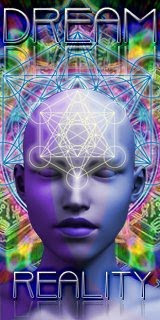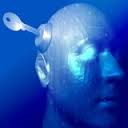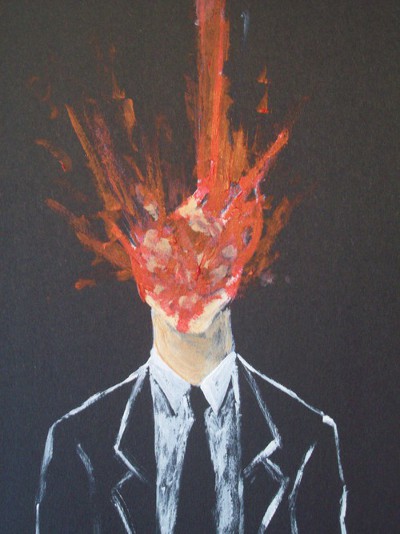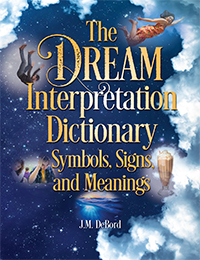Dreams about the future, aka precognitive dreams

Dreams help you make mysterious connections w info you could not know otherwise.
When I went public as a teacher of dream interpretation, I didn’t expect the #1 question I’d get would be about dreaming of future events — precognitive dreams — and how to distinguish them from ordinary dreams. The subject came up during my interviews on Coast to Coast AM and the Christine Upchurch Show.
Short answer: look for personal symbolism and rule out other possibilities. And pay attention to how vivid and emotional the dream is. Precognitive dreams that warn of imminent emergencies or flowering possibilities usually jolt you pretty good. They feel different than other dreams.
More often than not, precognitive dreams preview mundane events in life, such as what you hear on the news or talk about in conversation. Some people who have these dream experiences ask why dreams would bother showing something seemingly unimportant, and my answer is two part:
- Precognition happens all the time and doesn’t wait for just emergencies or big moments in life. The fact that you remember the dreams and recognize them as precognitive is a big step in the right direction. You can even take it as a sign you are “tuned in” to the subtle undercurrents of life. Eventually, you are likely to dream ahead of time about something important that happens.
- Perhaps the moment in time previewed by a dream only appears mundane. It might show you an important decision point that will establish a pattern in your life or affect a relationship. Like the Butterfly Effect, small actions can produce big changes.
I turned this post into a podcast with a more extensive discussion. You can listen and download here:
Rule out obvious possibilities
Before concluding that a dream is precognitive, rule out the possibility it’s about something personal to you. The majority of dreams for most people are entirely personal. Do you see memory residue from the previous day in the dream you think could be precognitive? Does it express your anxieties or wishes?
Physicist Russel Targ studies precognition and uses this example: You know you haven’t studied for a test, you dream you fail it, then really do fail it. That’s a self-fulfilling prophecy, not precognition.
While everyone has the innate ability to dream forward and backward (retrocognition) in time, in my experience only a subset of the population do it regularly and remember. Most people don’t remember their dreams well enough to know that they dream regularly about future (and past) events.
When the psychic Edgar Cayce said, “Dreams are today’s answers to tomorrow’s questions,” he spoke from the personal knowledge that some dreams are precognitive. He also said, nothing of importance happens in our lives that is not foreshadowed in dreams.
Sugar Ray’s dream about killing Jimmy Doyle

Sugar Ray knocked out Doyle in the 8th round. Doyle died later that night.
I use boxer Sugar Ray Robinson’s dream about killing his opponent in the ring as an example to show how to separate an ordinary dream from a precognitive one, in my book Dreams 1-2-3: Remember, Interpret, and Live Your Dreams. Prior to his welterweight bout with Jimmy Doyle in 1947, Sugar Ray dreamed that he knocked out Doyle and Doyle subsequently died. It so unnerved Sugar Ray, he tried to back out of the fight. The fight promoter brought in a priest to assure Robinson it was “only a dream.” The rest is history.
If I counseled Robinson about his dream, I’d begin by asking him if its details match waking reality. Is the arena the same as the one in which he is scheduled to fight? Are the people nearby the same ones he anticipates to be at the fight, such as the trainers and referee? Discrepancies between waking reality and dream reality are a sign of personal symbolism, though precognitive dreams do not always match up perfectly with reality.
Next I’d explore the possibilities for symbolism. Killing someone in a dream can express personal hostility. Do Robinson and Doyle have bad blood between them? Does Robinson feel like he “could kill that guy” in the figurative sense? If so, odds are better that the dream expresses those feelings. It’s probably not precognitive.
Then I’d explore if the dream expresses a subconscious fear. Fighters die in the ring, rarely, but it happens. Sugar Ray was a great fighter with a big knockout punch but was an honorable sportsman and kind human being. I’d ask him if he fears unintentionally killing Doyle.
Some digging through historical accounts of the bout uncovered that possibility. Doyle, a tenacious Irish fighter who publicly proclaimed he was fighting Robinson to earn the money to buy his mother a house, was known to have head issues. It’s possible Sugar Ray’s dream expresses fear that Doyle should not be boxing anymore, then the fear came true. The dream might not have been precognitive in the strictest sense. Unfortunately, we can’t ask Robinson the questions needed to make that determination.
However, in his autobiography, Robinson wrote:
“I had knocked out guys before, dozens of them. But in those fights, I always had a good feeling, a conquering feeling when I saw them being counted out, maybe because I could see that they weren’t really hurt. But now, with Doyle stretched out and his eyes blank, I had that empty feeling you get when something in your life is really wrong, and all I could think of was the dream.”
Robinson added, “You warned me, God. You told me. Why did I let everyone talk me out of it?”
It’s a lot easier to judge after the fact that a dream is literal or precognitive.
Dream about plane crash and jitters to take flight
A guy at Reddit Dreams, a large online forum I lead, once asked me if a dream he had about a plane crash warned him he should not get on a flight scheduled for the next day. I asked him if details from the dream matched waking reality. Is the airplane in the dream from the same airline he booked, and is it the same type? Are the airport and concourse the same? His answers showed discrepancies between the dream and reality.
While precognitive dreams can use symbolism and metaphor, they are more likely to match reality. As a rule of thumb, if a dream is precognitive and metaphorical, the entire dream will be metaphorical, not just pieces of it.

You can dream about the future.
With that in mind, I had a hunch and asked the guy if something in his recent life could be symbolized as a plane crash. Planes take us to personal destinations. What does it say if the plane doesn’t make it? This dream theme pops up most often when people are beginning something new and exciting like a romantic relationship or business venture and it fails. Or they have a hope for the future that doesn’t pan out. The guy answered yes, something he had high hopes for related to his job recently “crashed” in the figurative sense.
In the dream-story, the flight relates to his work. That’s why he’s at the airport. It connects the dream with his work life and the personal destination he’d like to reach through this job.
At the risk of being wrong I told him I did not think his dream was precognitive. I checked the news the next day and fortunately, no reports of plane crashes.
Precognition in metaphorical dreams
Now let’s look at an extraordinary example of a precognitive dream that uses metaphor and symbolism.
A man dreams he’s at home but it’s more like a medieval hut. He’s preparing a big pot of meaty stew that he knows will feed his family and friends. Suddenly, he gets a bad feeling when hears a commotion outside. He goes to lock the front door, but it bursts open and in march three wolves, led by a massive alpha. They have red eyes and make a frightening sight. He can’t win a fight against them so he decides it’s best to try to befriend them. He reaches out and pets the alpha wolf and is friendly and likeable with it. The alpha turns to the other wolves and says, “We’re going to have to meet to discuss what to do with these humans.”
At the time of the dream, the man, the provider for his household, is preparing to license out a software program he created and loaned to the company he used to work for. A larger company gobbled up that company and his job was eliminated. His software is no use to them, so he updated it and lined up clients. Companies have used the software for years and love it. He just needs a letter verifying his ownership of the software and the checks can start rolling in.
… He pushes for a few months to get that letter and finally one arrives. It’s a legal notice. The new company is contesting his ownership of the software. There’s enough grey area to tie up the issue in court and even sue him. He’s facing big legal bills and possibly years to resolve the matter. A team of three lawyers represents the company, and the lead attorney is a legal powerhouse, an “alpha.” They make clear they mean business. The situation is tense and threatening.
 In a personal sense, the dreamer’s home is threatened. Three wolves just marched in and halted his plan for how he will provide for his family.
In a personal sense, the dreamer’s home is threatened. Three wolves just marched in and halted his plan for how he will provide for his family.
He remembers the dream and feels strongly that it previewed the situation and offered a suggestion. He can’t win against the “wolves,” like in the dream, and fighting them is foolhardy, but he needs the income from the software to feed his family, symbolized as the pot of meaty stew. He’s tempted to hire a lawyer and fight it out, confident he’ll win in the end because he can prove he owns the software. Instead, following the advice of the dream, he reaches out to the lead attorney.
In a dramatic phone conference with the legal team, he speaks on a personal level, explaining that he needs the software to support his family, and in return for settling the matter he can help the company fix a problem. He’s friendly, like in the dream. He reaches out, like in the dream.
The lead attorney, a mother who knows what it’s like to support a family, initially balks at his deal, then a week later mysteriously agrees to it. Soon afterward, they sign the paperwork, situation resolved. He gets the clear legal ownership he needs to sell the software.
The entire dream is metaphorical. It can’t be proven as precognition, but the overlapping details between the dream and subsequent events give me confidence to present it as evidence. The person who had the dream has a lifetime of experience with precognitive dreams and he knows one when he sees it. I trust his instincts.
Evidence of Precognition
An investigation of train crashes on the U.S. east coast during the 1950s concludes that trains that crashed or derailed had significantly fewer passengers than the same trains on other days. The four passenger planes hijacked on September 11, 2001 had half their usual number of passengers.
 You don’t have to look far to find reports of people who don’t board flights that crash because of a bad feeling. But sometimes, the reason why people miss those flights appears to be dumb luck. Funny man Seth MacFarlane was booked on American Airlines Flight 11 on the morning of September 11, 2001, but arrived ten minutes late because his travel agent gave him the wrong departure time.
You don’t have to look far to find reports of people who don’t board flights that crash because of a bad feeling. But sometimes, the reason why people miss those flights appears to be dumb luck. Funny man Seth MacFarlane was booked on American Airlines Flight 11 on the morning of September 11, 2001, but arrived ten minutes late because his travel agent gave him the wrong departure time.
Who knows, sometimes what we call luck is otherwise known as synchronicity, a meaningful coincidence.
To really dig into evidence based on research, start with the paper Future Directions in Precognition Research, found at PubMed, and use the extensive citations to do your own research. The evidence to support the existence of precognition is freely available and well-researched, just not widely known.
Or, just start a conversation with a group of open-minded friends. I bet you’ll get at least one person to admit they think they dream about the future.
Trust Your Gut
Which brings us around to the best way to tell a precognitive dream from an ordinary one: intuition. Gut feeling. Precognition is a fact of life; trust it. Precognitive dreams are unusually clear and vivid. A feeling like deja vu can accompany them. When precognitive dreams warn of coming danger or emergency, they spark strong emotions. Additionally, a buzzing sound while dreaming or strong ringing in the ears after waking are occasionally mentioned as accompaniments to precognitive warning dreams.
If you analyze a dream that you suspect is precognitive and it:
a). is not related to residue from the previous day;
b). is not an expression of anxiety;
c). is not wish-fulfillment, and;
d). is not personal symbolism;
Then consider that it’s precognitive. But most of all, trust your gut. That’s your best way to determine whether a dream is precognitive.
Engineer J.W. Dunne kept meticulous notes on his dreams for decades and proposed that as much of half the dreams he chronicalled came true. I can only say that the same isn’t true for me but who knows. Dunne proposed a theory that precognitive dreams happen because the dreaming mind isn’t attached to linear time like the conscious mind. To the dreaming mind, past, present and future are all one. Albert Einstein said it’s the nature of time itself. Space itself is non-local, so everything in it connects as if it’s all part of the same body.
I asked physicist Russel Targ about precognition, a subject Targ studied in great depth, and he thinks Einstein explains it best through non-locality and Dunne’s theory about the dreaming mind’s ability to see anywhere in time it wants to go. Which suggests something deeper directing it, a deeper reason behind a phenomenon that’s widely experienced in the population but not commonly understood.
Forecasts Can Change
Precognition is not prophecy. It’s a forecast. Precognition gives us the ability to act ahead of time and if possible change an outcome, or to help it along if it’s something you want to happen. Forecasts can always change, but that doesn’t mean you are responsible for the outcome. Some things you can’t change even if you dream about them ahead of time.
 A personally vexing example comes from my appearance on Coast to Coast AM with George Noory. During hour-three of the interview, a call-in listener asked me if I thought a dream she had about her mom falling down steps was precognitive. What she saw in the dream actually transpired, and her mom died. Drawing on my limited experience at the time, I said yes, the dream appears precognitive. Then she felt terrible because she thought she could have prevented the accident.
A personally vexing example comes from my appearance on Coast to Coast AM with George Noory. During hour-three of the interview, a call-in listener asked me if I thought a dream she had about her mom falling down steps was precognitive. What she saw in the dream actually transpired, and her mom died. Drawing on my limited experience at the time, I said yes, the dream appears precognitive. Then she felt terrible because she thought she could have prevented the accident.
I had too much on my mind at the time to realize what my opinion meant to her, but the next day it hit me and I felt terrible for not making clear to her that even when a dream is precognitive, it doesn’t mean you have the responsibility or ability to change it. How was she supposed to know it would really happen? Precognitive dreaming is such a tricky subject.
Practice dream interpretation!
Judging the difference between precognition and ordinary dreams becomes easier with practice. You learn to recognize the methods of your master storyteller the dreaming mind, to tell when something is out of the ordinary or matches your personal patterns. Keeping a dream journal is your best practice, because it preserves the details of your dreams that might otherwise be forgotten and helps you track precognitive ones. They are distinct from the rest.
For example, if you dream frequently about driving on ice and losing control of your car, you know your dreams use that theme to symbolize something going on in your life, probably related to control of yourself or a situation. But if you never dream about that theme, and you drive in a place that could have ice on the ground, you are wise to at least consider the possibility that the dream is precognitive–especially if it’s “real:” in your car or one you recognize, not an imaginary one, and the roads you drive on are “real.”
Dream researcher Ian Wilson had such a dream, took action, and it might have saved the lives of his daughter and himself.
This schoolteacher dreamed she was going to get robbed and it happened. Then she dreamed about Death coming for a friend and told her friend about it. That friend and the friend’s aunt had death-related dreams involving the lungs, so the friend went to the ER and struggled with the doctors to get an MRI of her lungs. Turns out, she had a blood clot that could have killed her.
How Long Till a Dream Comes True
Research at the National Dream Center suggests that precognitive dreams come to pass within two weeks, Ian Wilson says three to four weeks, but they can come true many years later.
Precognition is normal – everyone does it
Precognition is a normal human ability, widely reported among all population groups that have been studied. Dreams are the most popular way it manifests because the mind is in the right state to process the information. Most of the mind is unconscious, and most of the information it receives is subconscious; only a small percentage gets through to the conscious mind.

Precognition and Professor Persinger’s work are mind-blowing.
Professor Michael Persinger’s research shows that all human brains are connected together by Earth’s magnetic field, like a worldwide internet of the mind. Individuals have to filter most of it out to function normally. Otherwise, brain overload! However, people who cultivate the ability to tap into that information stream can access any information they desire, including possibilities for future events.
This subject really sparks interest and is a popular one during my media appearances. That interest and the importance of offering the best advice I can pushed me deep, and now I am much better equipped to offer my opinion. I hope you are more enlightened now, too.
Further information about precognition:
Ian Wilson’s theory about precognition. Well-researched and cited.
An Experiment with Time, a seminal work about dream precognition.
Russ Targ’s TED Talk Not exactly about precognition but explores PSI ability in general.
Precognitive dreams about the 2011 Japan tsunami.
Dreams 123.com, to learn more about my system of dreamwork.





Hello! I might had a precognitive dream, which came true two years later. I am in a ship about to sail off, together with my coworkers. We are sailing towards the foreign land, where I, at that time, longed to live. We buried the ‘big boss’ and I am at his grave in the ship. His grave is covered with earth. Then, suddenly, a light bulbs begin to twinkle, something like an electric short-circuit. I know nothing is really dangerous with that, but I panic and leave the ship. While getting off, many people were going in the opposite direction -getting on the ship. Fast forward two years later, I am living in that foreign land (at the time of dreaming I was preparing to leave my home country and go there) and pandemic starts, I panic and leave the country, making a decision in a moment.
I am still not sure if the dream was precognitive or not, my therapist at the time told me it was a precognitive dream and I advised me to avoid going back to my home country, should that kind of situation occur. For better or worse, I went back to my home country IRL.
So, if my dream was precognitive, I have the following theory: I think our subconscious doesn’t know time, but only its own contents, the recurring themes in our life that repeat themselves until we solve them, something like in the movie Groundhog day. In line with this, precognition is logical, since we create our own lives.
My only experience with precognitive dreams was *entirely mundane* in nature. I was 13 years old, and I had this friend who had been carrying around of folding scissors (like you might get in a travel sewing kit). In my dream, my friend had lost his scissors, and we spent hours searching for them, only for them to turn up in the tackle box belonging to one of our other friends.
The next day, sure enough, my friend lost his scissors – that was when I remembered the dream, and I said ‘let’s look in *other friend’s* tackle box. They both accused me of having planted them there, but I didn’t. All I did was cut out the hours of searching.
I didn’t see my other friend take the scissors, and I don’t think I ever saw him show any interest in taking the scissors, yet that’s the only rational conclusion I can come to – somehow I subconsciously knew he’d done so, and just predicted the outcome in my dream. But the situation was so *exact*.
I dunno what to make of this, other than frustration that of all the more *useful* things to have a prophetic dream about, it had to be these stupid scissors.
Your first brush with a precognitive dream is a common one in the sense that you dream of something that happens in the future with exact detail, so much so that you know it can’t be coincidence. But it’s mundane. And that’s how it works. Precognition is a normal function of the dreaming mind. Most of your life is mundane so most of your precog dreams are too.
If it’s a normal function of the dreaming mind, why then has it never happened again? That’s what I don’t get – in my almost 40 years of life, that silly dream is the only precognitive one I’ve ever had.
It’s the one you remember. You are likely to have had others.
What about a personal precognition? I once dreamt of my bloody guts falling out –
and my parents ignoring me, while my relatives attended to my emergency. A year or so later, I was admitted into the hospital for gastrointestinal bleeding (a surprise find from a full-body check up) when I was in a different country in which my relatives live, and away from my parents.
These are the most common kinds of precognition: the personal kind. Most precognitive dreams are about what’s coming up in your life.